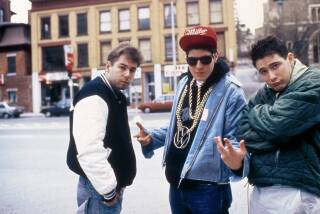Wal-Mart Parodist Sues to Sell Products
- Share via
Computer store owner Charles Smith is the first to admit the T-shirts and mugs he designed to lampoon Wal-Mart Stores Inc. are in bad taste.
But Smith had wanted to make a point by comparing the giant retail company to the Nazis. So he created slogans playing off the Bentonville, Ark., firm’s familiar logo, including “I {heart} WAL*OCAUST. They have family values and their alcohol, tobacco and firearms are 20% off.”
Wal-Mart wasn’t amused. The company launched a legal battle by writing a cease-and-desist demand that led Smith to file suit Monday in federal court in Atlanta -- with the help of Ralph Nader’s legal aid group, Public Citizen -- for the right to continue selling the products.
At stake, Smith said, is his right to publicly criticize the world’s largest retailer -- or any other company.
“It’s about free speech and the right to comment on corporations and their images and their trademarks,” said Paul Alan Levy, the Public Citizen lawyer representing Smith. “Just because the trademark owner doesn’t like [it] doesn’t mean it isn’t a permissible use of language.”
In his suit, Smith asks the court to rule that his products are protected by the 1st Amendment and do not infringe Wal-Mart’s trademark because there is no likelihood someone might think they were sponsored by Wal-Mart.
Wal-Mart said it was required by trademark law to protect its name and logo.
“Wal-Mart will aggressively protect our brand by taking appropriate legal action against those that inappropriately use our name or improperly profit from our name,” Wal-Mart spokeswoman Sarah Clark said.
The case is the latest to pit corporate trademark rights against free-speech rights. In a suit that ended in 2004, for example, El Segundo-based Mattel Inc. lost to an artist who used Barbie dolls in photographs parodying the iconic toys.
First Amendment rights may win out in Smith’s case as well, one legal expert said.
“There’s a pretty strong free-speech argument,” said Neil Netanel, a UCLA law professor and an expert in copyright, intellectual property and 1st Amendment law. “If it’s clear that what’s happening is an effort to criticize and parody the trademark owner to make a point, then courts will generally side in favor of the parodist.”
Smith, a 48-year-old father of three from Conyers, Ga., said he made the designs after thinking that Wal-Mart’s destructive effect on people and neighborhoods was like the destruction wrought by the Holocaust.
In July, he put the designs on the Internet at Foster City, Calif.-based CafePress.com, which allows customers to buy T-shirts, mugs and other items with the imprint of their choice. He promoted the products on his website, www.walocaust.com.In five months, Smith sold just one $16.99 shirt, of which he received $5.10. Then, in December, Wal-Mart lawyers wrote to Smith and CafePress, demanding that they stop selling the designs and that Smith stop using the domain name walocaust.com.
The online store complied. Smith did not.
With no way to sell his products, Smith turned to Robert Greenwald, creator of the anti-Wal-Mart documentary film, “Wal-Mart: The High Cost of Low Price,” who helped Smith find an attorney.
“My stuff is in bad taste, because what Wal-Mart does is in bad taste,” Smith said. “I thought maybe someone would get this and wear it to a Wal-Mart meeting or something.”
More to Read
Inside the business of entertainment
The Wide Shot brings you news, analysis and insights on everything from streaming wars to production — and what it all means for the future.
You may occasionally receive promotional content from the Los Angeles Times.










